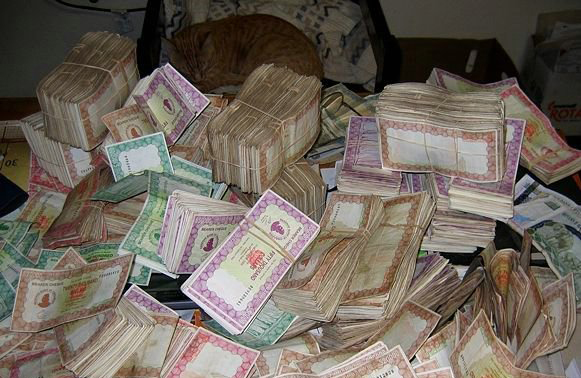
Central bank governor John Mangudya has clarified that $5 is the minimum that will be paid to each individual bank account holder as compensation for the Zimdollars people lost when the country switched to the current multi-currency regime in 2009.
BY VICTORIA MTOMBA
Mangudya told The Standard that the full amount people will be compensated for their losses were being worked out using the United Nations exchange rate.
“If we used the UN rate for all accounts some accounts will get zero but we are saying the minimum that everyone will get from the Zimbabwe dollar accounts is $5,” he said.
“The maximum that one gets will be determined by the UN rate as well. Demonetisation is not compensation for inflation. Some people are expecting the central bank to compensate for the ills of inflation. That is not the role of government and no one in the world has been compensated for the ills of inflation.”
Mangudya said the central bank was seeing demonetisation as the burying of the local currency.
He said in demonetisation, “We are seeing confidence building. We are removing Zimbabwe Dollar from the systems of banks. Because banks still have these Zimbabwe dollar balances in their accounts.”
Mangudya said banks were in the process of submitting the Zimbabwe dollar accounts to the central bank for demonitisation which was recently allocated $20 million by the RBZ.
The central bank expects to have completed the demonetisation process by the first half of this year.
However, Zimbabwe Congress Trade Union (ZCTU) president George Nkiwane said the process should be done in a transparent, holistic and inclusive manner.
“As it is, there is no clarity on the actual and specific modalities of the demonetisation process. It is not also clear what is going to happen to people’s Zim dollar pensions and other investments that were not deposited in the banking system per se,” Nkiwane said.
“It would seem that this demonetisation is going to benefit only the Zim dollar account holders with the banking system. It would also seem that the demonetisation process fails to take into account the time value of money, for instance 1 million Zimbabwe dollars in 2005 is worth much more than the same 1 million dollars at the cut off date in 2009 because of inflation. The whole process needs to be made more transparent and inclusive. The challenges with workers are to do with the lack of transparency and inclusivity in the whole process.” He said the $20 million allocated for the programme was not adequate to do justice and achieve equity.
Zimbabwe Pension and Insurance Rights Trust International general manager Martin Tarusenga said the procedure of the demonetisation process was not fair.
Tarusenga said when the country switched to the use of multi-currency, most coins and Zimbabwe dollar bearer cheques were valueless and people did not care about them.
“Few Zimbabweans cared about these cheques if they were not in sufficiently large volumes that would have been of some value. In the circumstances, it was and it still is not really called for to demonetise Zim$ ‘notes and coins’ or bearer cheques, as they were valueless,” he said.
“Use of the United Nations exchange rate, as the RBZ governor prescribes, is not called for or necessary in the case of the bearer cheques. In our case, therefore, demonetisation may in fact be a misnomer.”
He said the demonetisation policy left out those that had made deposits prior to the introduction of the multi-currencies say, in 1998, when the Zim$ had significant value and when the receiving bank could use this deposit for powerful investments including real investments such as property.
“It leaves out Pups [paid-up Permanent shares] with building societies, Unit Trusts, and other investments,” Tarusenga said.
“Giving out US$5 does not even show sincerity to correcting an abuse of one’s rights in this banking system — most have described it as a mockery. What is worse, most are already suspecting money set aside for this as a scheme to enrich themselves considering how opaque the whole thing has been.”
Tarusenga said the issues of the insurance and pensions sector was scheduled to be resolved through a pending Commission of Inquiry. He said stakeholders to pension and insurance service provision were already making submissions to the Inquiry.











